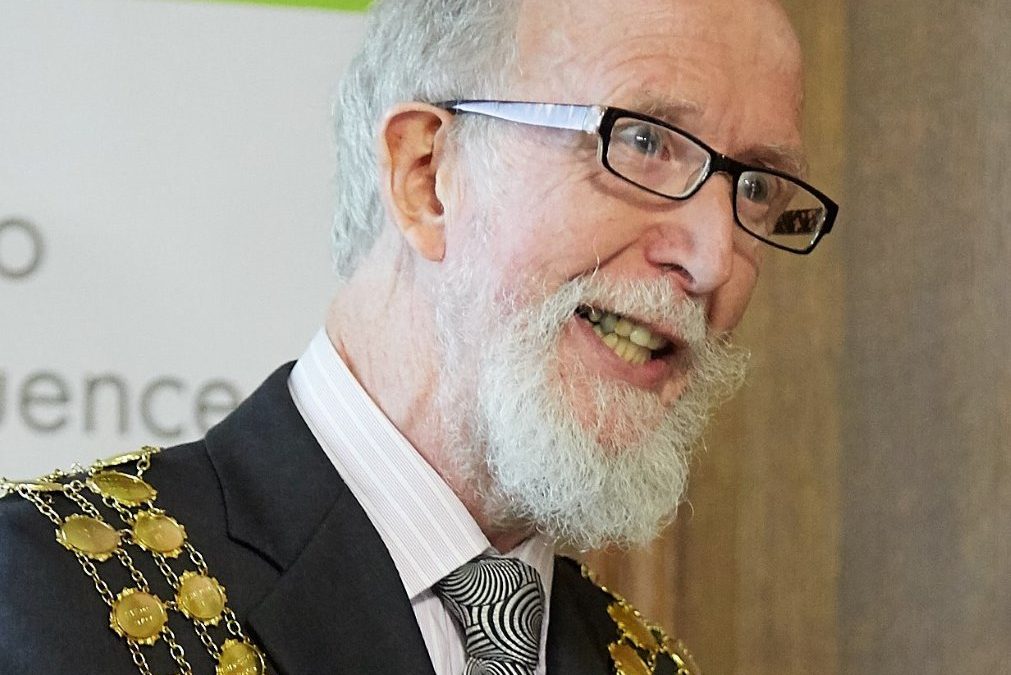
18 October, 2017 | Awards, Resource and waste management
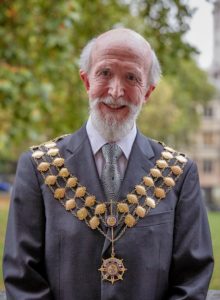
Professor David C Wilson following his inauguration in Westminster as 2017-18 CIWM President
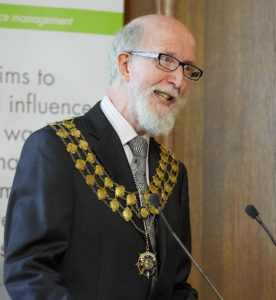
Professor David C Wilson giving his inauguration speech as CIWM President 2017-18
https://samtech.edu/accutane-treating/
Professor David C. Wilson has been inaugurated as the 102nd President of CIWM, the UK and Irish professional body for resources and waste, at a reception in London. He described solid waste management as one of the key utilities and said that as public sector budgets continue to come under pressure, “we must not lose sight of where we have come from, that the service exists first and foremost to protect public health”. He highlighted the ‘global waste management emergency’, where 40% of the World’s population lacks this basic utility service. He also launched his Presidential report, Making Waste Work: A Toolkit, prepared by WasteAid UK and aimed at helping unserved communities in the least developed countries to help themselves, by developing self-sustaining businesses making useful products for the local market from the resource value in their waste.
Outlining the importance of legislation in the substantial progress that has been made in the sustainable and safe management of waste since the early 1970s, Professor Wilson added that there can be no softening of the regulatory framework. “Two major priorities for CIWM in the UK are to ensure that following Brexit we have continuity of the strong regulations on which the very existence of the waste and resources industry depends, and the continuing fight against waste crime.”
While continuity is important on one hand, DCW went on to talk about the step change in approach to resources and waste that is happening, and he called for a “necessary parallel focus on the 3Rs – reduce, reuse, recycle – and on the shift from the linear model to a circular economy where resource efficiency and productivity is key”. An integrated and inclusive approach will be needed, he said, as well as a balanced set of policy drivers.
Professor Wilson highlighted that, despite the progress that has been made, more than 2 billion people have no waste collection at all and the waste of over 3 billion people is either dumped or subject to uncontrolled burning. This matters: for example, children growing up in households without waste collection have double the rate of diarrhoea and six times the rate of acute respiratory infection; and open burning of waste could double the current, official IPCC estimates of the contribution of methane emissions form landfill of waste to global warming. However, he also sees this ‘global waste management emergency’ as an opportunity for the international community. “If we can increase the proportion of existing international development finance being directed at SWM from the current, fairly derisory, 0.3% to just 3% up to 2030, as recommended in the GWMO, then not only can we extend waste collection to all and eliminate open dumping and burning of waste, but due to the cross-cutting nature of waste management, we can also make progress against no fewer than 12 out of the 17 UN Sustainable Development Goals agreed by world leaders to achieve a sustainable future for our planet.”
Press coverage:
Resource: Community waste schemes, the global waste crisis, domestic issues, DCW’s life in waste.
Waste Management World: Waste as a utility, domestic issues, the global waste emergency.
Letsrecycle.com: Global waste emergency, community waste toolkit
Recycling Waste World: Community waste toolkit
CIWM-journal: Waste as a utility, domestic issues, the global waste emergency, community waste toolkit
Interview with DCW in CIWM Journal:
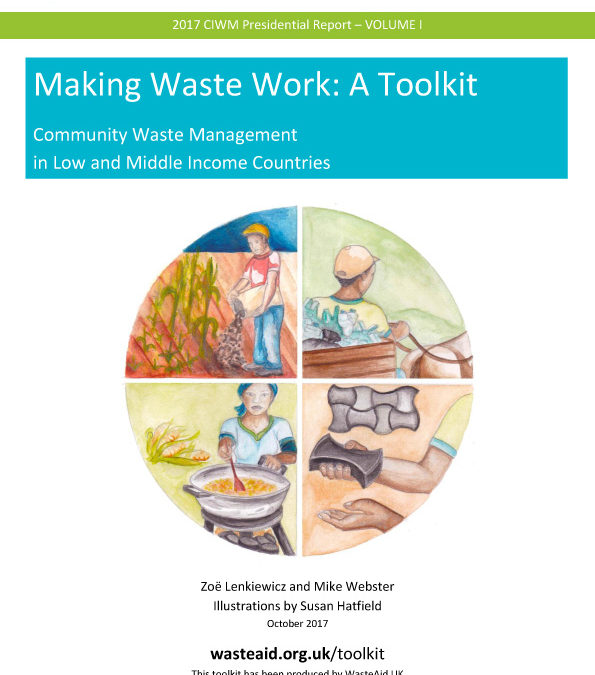
18 October, 2017 | Publication, Waste Management
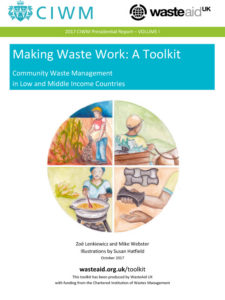
DCW’s CIWM Presidential Report 2017 prepared by WasteAid UK

Professor David C Wilson giving his inauguration speech as CIWM President 2017-18
At his inauguration on 17th October 2017, Professor David C. Wilson launched his CIWM Presidential Report: Making Waste Work: A Toolkit – Community Waste Management in Low and Middle Income Countries. The aim is to help poor communities in the least developed countries, part of the 40% of the World’s population who lack access to any solid waste management services, to help themselves by developing self-sustaining businesses making useful products for the local market from the resource value in their waste. WasteAid UK have prepared this practical guidance on low cost recycling technologies, involving minimal capital investment, to help people become self-employed recycling entrepreneurs, providing a very valuable service for the health and well-being of their community, and the whole planet – as well as reducing poverty and creating sustainable livelihoods.
In his inauguration speech, DCW called on the international community to increase substantially, from the current 0/3% to 3.0%, the proportion of Official Development Assistance directed to solving the ‘global waste emergency’. But he also said that it was not enough to work with national and local governments to solve the problem from the ‘top down’. In parallel, it is necessary to work from the ‘bottom up’, helping communities in the poorest countries, where the local authority often has no funds to provide a service, to tackle the problem themselves through the resource value in the wastes. If, for example, food wastes or plastics are kept separate, they can be turned into new, useful products. One of the gaps identified by UNEP’s Global Waste Management Outlook ( GWMO – for which DCW was the lead author) was for practical guidance on low-cost ‘waste to wealth’ technologies which involve minimal capital investment and make products to sell in a local market.
Making Waste Work: A Toolkit has been developed by WasteAid UK to fill that gap, providing accessible and well-illustrated guidance designed for use by local practitioners. An early draft of the report was field tested at a pan-African workshop in The Gambia. Volume 1 covers part A, Be informed: Community waste management essentials, and part B, Be prepared: How do I make a waste project happen? Volume 2 covers part C, Be inspired: Step-by-step guides, which include measuring what is in your waste, five technologies for recovering value from organic wastes, four focusing on plastic wastes, plus waste collection and safe disposal of the residual wastes. There is also a short Executive Summary. The links above are to the three reports on the CIWM website; the dedicated WasteAid Toolkit homepage gives access to all the material, including the individual How-to guides, in separate user friendly formats designed for mobile devices and for laptops/ desktops.
27 August, 2017 | Conference
The German Development Bank KfW’s annual international Development Finance Forum will this year focus on the world’s oceans: Oceans 21 -Solutions for a sustainable marine future. Professor David C Wilson has been invited as the opening keynote speaker on one of the three parallel strands of the Forum, focusing on marine litter and marine plastics. The working hypothesis is that avoiding marine litter requires predominantly measures to reduce land-based sources, and of these the largest contributor by weight is inadequate solid waste management in low and middle income countries. DCW will suggest that extending waste collection to all, and eliminating open dumping of wastes, in these countries would likely reduce plastics entering the oceans by more than half. More details will follow the Forum, which is to be held in Frankfurt on 21-22 November 2017.https://corazoninc.com/cialis-cheap-20mg/
10 March, 2017 | Publication, Waste Management
Ljiljana Rodic and David C Wilson’s paper in the peer-reviewed open access journal Sustainability was published today: Resolving Governance Issues to Achieve Priority Sustainable Development Goals Related to Solid Waste Management in Developing Countries. As a key utility service that more than 2 billion people are currently lacking, solid waste management (SWM) is a crosscutting issue that can be directly linked to 12 out of the 17 UN Sustainable Development Goals (SDGs). Distinguishing between physical components and governance aspects of SWM, this research focuses on governance issues concerning basic solid waste collection services and controlled disposal, thus addressing the ‘How’ and the ‘Who’ dimensions of a SWM system.
As a form of transdisciplinary research, the findings from the literature on governance issues in SWM were iteratively subjected to several rounds of commentary by a large group of stakeholders from six continents, within the authors’ work for the United Nations Environment Programme (UNEP)’s 2015 Global Waste Management Outlook. The study identifies a combination of complementary instruments required for extending collection to all and bringing disposal under control. While municipalities have a legal responsibility for providing services to their citizens, various service providers can contribute to an effective SWM system. Appropriate forms of funding are essential to secure financial sustainability of the services under the local conditions of affordability and willingness to pay. As new services require behavioural change on the part of citizens and municipal waste departments alike, communication and exchange with other stakeholders function as enabling and supporting factors. The significance of capacity development is highlighted.
20 November, 2013 | Waste Management
Following the Rio+20 Earth Summit, the United Nations Environment Programme (UNEP) was mandated to prepare an authoritative global outlook of challenges, trends and policies on waste and resource management.UNEP’s International Environment and Technology Centre (IETC) and the International Solid Waste Association (ISWA) have this week announcedthat work has now started on the first Global Waste Management Outlook, aiming for a 2015 publication. Professor David C Wilson has been appointed as Editor in Chief.
The UNEP mandate to prepare the Global Waste Management Outlook (GWMO) originated from the outcome of the Rio+20 United Nations Conference on Sustainable Development in 2012. Preparation is being led by the IETC in Osaka, japan, in asociation with ISWA. A first stakeholder consultation meeting was held 8-9 July at the UNESCO Headquarters, Paris.
The Editorial Team includes DCW as Editor in Chief; Costas Velis as Advisor and Contributor; Lead authors Ljiljana Rodic, Prasad Modak, and Otto Simonett; and Mona Iyer as Case Study Editor. Mini CVs for each core team member are on the IETC website.
Wide consultation with a broad group of stakeholders including decision makers, the world’s leading institutions and experts in waste management will be central to the development of the GWMO. The first consultations in the format of e-regional consultations on the first draft annotated chapter outlines were launched today, 20 December 2013, and close on 27 January 2014.
The final document is aimed to be concluded within the first quarter of 2015 and is proposed to be a valuable tool for decision makers, decision formers and professionals, offering a validated comparative analysis on the state of waste management around the globe, based on standardised policy indicators and benchmarks.
UNEP IETC and ISWA are seeking further contributors to the project particularly sponsors to help support future in person consultations. If you are interested in contributing to the GWMO then please contact the GWMO Project Manager at [email protected], cc[email protected]




